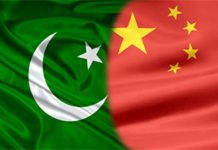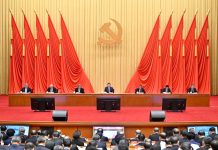
The forum brought together over 60 foreign legislators and former legislators from five continents, as well as more than 60 deputies to China’s National People’s Congress (the top legislature) and local people’s congresses. Discussions focused on topics such as high-quality Belt and Road cooperation, ecological conservation and green development, and ethnic unity and shared progress.
The Belt and Road Initiative (BRI) is a China-proposed framework to boost connectivity along and beyond the ancient Silk Road routes.
The meeting concluded with the adoption of the Urumqi Declaration of the 2025 Legislators Forum for Friendly Exchanges.
Embracing a global vision
The declaration called on legislative bodies around the world to promote an equal and orderly multipolar world, firmly safeguard the international system with the United Nations as its core and the international order underpinned by international law, and uphold the sovereign equality and mutual respect of all countries as well as multilateralism.
Belarusian representative Sergei Aleinik said Belarus and China share the goal of building a fair and just world order. Edin Djerlek, Vice President of Serbia’s National Assembly, noted that the community with a shared future between Serbia and China reflects “trust and long-term commitment.” Richard Koon, Speaker of Liberia’s House of Representatives, said China’s initiatives have inspired cooperation and provided a platform to advance global development goals.
Participants agreed that parliamentary diplomacy plays a unique role in promoting dialogue, building bridges, strengthening peace and advancing cooperation. Emanuel Alberto Duarte Barbosa, Deputy Speaker of Cape Verde’s parliament, stressed that inter-parliamentary collaboration is especially necessary in today’s complex world.
Delegates expressed support for institutionalizing the forum mechanism and welcomed the proposal to hold the next forum in China in 2026. Suwaibou Touray, a member of the Pan-African Parliament, proposed creating a “Global South Parliamentary Knowledge Center” to strengthen collective bargaining and policy coordination among developing countries.
Former New Zealand House of Representatives Speaker David Carter commended China for acting responsibly as a major country and contributing to global peace and stability. Mexican Senator Yeidckol Polevnsky described China as “a hope for the world,” citing its major contributions to tackling climate change and food security. South African legislator Nqabayomzi Kwankwa also highlighted the strong strategic partnership between China and South Africa within multilateral frameworks.

Recognizing a path to modernization
Carter described China’s rapid growth as “one of the most remarkable economic transformations in human history,” noting how hundreds of millions had been lifted out of extreme poverty as of late 2020. Barbosa praised China’s development vitality and well-ordered progress. Aleinik said that through field visits, he and other delegates witnessed firsthand the impressive progress across China—including in Xinjiang—and how people’s quality of life has considerably improved.
Many lawmakers spoke highly of the achievements made in Xinjiang over the past 70 years. The Urumqi declaration highlighted Xinjiang’s social stability, economic prosperity, ethnic unity, religious harmony and overall wellbeing of its people. Nehker Gaye, a legislator from Libya, said the Chinese Central Government’s inclusive approach to governance has been key to Xinjiang’s success. Busayo Oluwole Oke, a Nigerian lawmaker, said Xinjiang’s energetic development is “truly inspiring and worth learning from for Africa.”
The declaration recognized Chinese modernization as offering a new paradigm for the world. Mexican Senator Yeidckol Polevnsky and Lao legislator Vandy Bouthasavong said China’s leadership in technology, innovation and socio-economic governance provides valuable lessons for other nations. Nicolás Viera from Uruguay noted that China’s success lies in blending historical continuity with strategic pragmatism, creating a development model distinct from the West yet open to global cooperation.

Supporting the BRI for global cooperation
Pakistani legislator Mohammad Ilyas Choudhary called the BRI one of the most influential development platforms in the world, citing the China-Pakistan Economic Corridor as a model of win-win cooperation. Brian Mudumi from Zimbabwe shared how infrastructure projects under the BRI have brought real, tangible benefits to local communities. Sri Lankan lawmaker Anuradha Jayaratne expressed full support for the initiative’s shift from rapid
expansion to a stronger focus on quality and sustainability.
Aleinik described the BRI as “the most important initiative of the 21st century,” noting that its principle of consultation, joint contribution and shared benefits sets it apart from Western approaches. Barbosa said the BRI transcends old binaries and gives countries room to grow. Zambian representative Christopher Shakafuswa highlighted that the BRI is built on mutual benefit and non-interference in domestic affairs.
Lawmakers, including Mustapha Temmar from Algeria and Ghoibnazarzoda Said from Tajikistan, said the BRI demonstrates the strength and depth of strategic partnerships and expressed hope for broader cooperation in the future. Brice Dimitri Bayendissa from the Republic of the Congo said the initiative has played a major role in supporting sustainable infrastructure development.
Promoting diversity and unity
Joseph Thomas Isaac, Speaker of the House of Assembly of Dominica, said he personally witnessed scenes of harmony among different ethnic groups during his visit to Aksu. Italian Senator Ettore Licheri said Xinjiang has shown the world a model of peaceful coexistence among diverse communities. Liberian Parliamentary Speaker Koon said China’s policies promoting economic integration and social inclusion have ensured ethnic equality and unity.
Delegates including Isaac and Sekou Kanneh of Liberia praised Xinjiang’s efforts to protect and pass down minority cultures. They noted the region’s work in improving public cultural services and promoting both the national common language and ethnic languages.
Brazilian legislator Sergio Aguiar said Xinjiang’s experience shows that human rights should be understood from both individual and collective perspectives, emphasizing the importance of the right to development and cultural rights. Gaye of Libya said all ethnic groups in Xinjiang enjoy equal protection and that the rights to life and development are safeguarded. The declaration explicitly opposed attempts by certain countries to politicize Xinjiang-related issues or interfere in China’s internal affairs.
Aguiar of Brazil said China’s system of regional ethnic autonomy offers valuable inspiration for the world, proving that respect for diversity and national unity can coexist. Mexican Senator Polevnsky said this system ensures broad participation of all ethnic groups in public life.
Strengthening green cooperation
Dominican Speaker Isaac said he was deeply impressed by the Keriya Wetland Project in Aksu and planned to share the experience back home. Hong Ihk-pyo, a former legislator from the Republic of Korea, highlighted Xinjiang’s achievements and potential in renewable energy development. Member of the Namibian National Assembly Salomon April said he hopes to learn from Xinjiang’s desert-control experience.
Bayendissa praised China’s 2060 carbon neutrality vision and its efforts in biodiversity protection and ecological restoration, calling China’s approach “a model for developing countries.” Jean-Marie Muhirwa of Burundi said he values opportunities to cooperate with China on building a greener, more sustainable future.
Greek legislator George Vrettakos said both China and Europe view climate action as the way forward and have already launched practical cooperation in several areas. Portuguese politician Hugo Carneiro noted the strong complementarity between China and Europe in renewable energy and circular economy development. Romanian lawmaker Cosmin-Ioan Corendea stressed that green cooperation between China and Europe “is not optional—it’s essential.” –The Daily Mail-Beijing Review news exchange item





